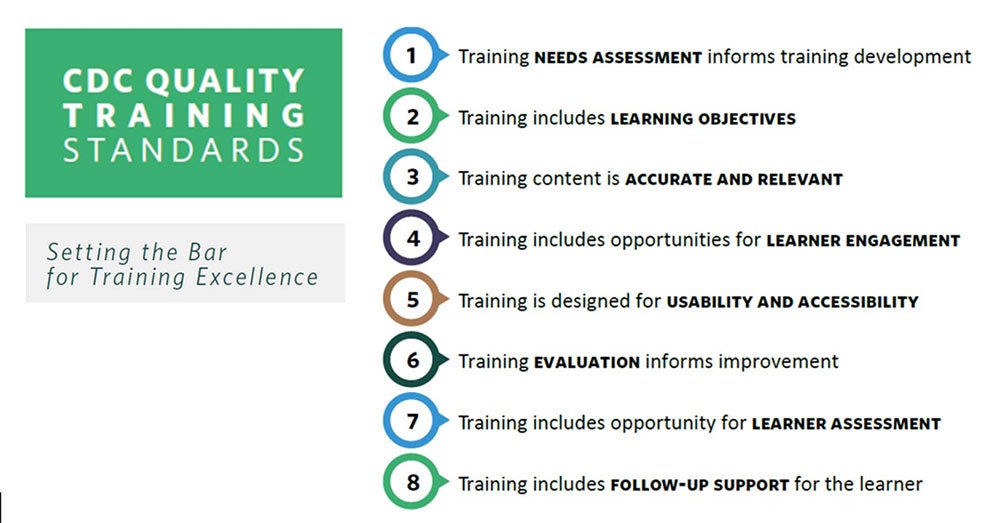The Surprising Time Savings Opportunity You May Be Missing: The Value of High-Quality Education

CloroxPro broke new ground when they launched the FIRST AND ONLY industry-wide training certificate course for commercial cleaners that is accredited by the ANSI National Accreditation Board (ANAB).1 To achieve this accreditation, they developed their online training course to meet over 130 requirements and went through a rigorous 3rd party review to confirm that their course met the ASTM E2659-18 standard.2 Receiving the ANAB-accreditation confirms the CloroxPro™ HealthyClean™ Trained Specialist Course provides high quality training and value to learners and raises the bar for education in the industry. It also means that employers can now be confident that the time spent on training will provide a return on their investment.
How do the requirements from ASTM E2659-18 lead to saving time?
Each requirement in the standard provides a framework for certificate courses to ensure optimal design, delivery, monitoring and learning outcomes. In short, the standard provides confidence that the training program does what it intends to do; and the learner gains the knowledge and skills outlined in the course. The 3rd party accreditation ensures the certificate holder has completed a high-quality course of study and they must pass a robust final evaluation to ensure learning objectives are met. Before the launch of the first version of the ASTM standard, there was no way to assess the quality of different certificate programs and if training was effective. The standard has since enabled “consumers, employers, government agencies, and others who rely upon a skilled workforce, to distinguish between qualified workers and those with fraudulent or less-than-quality credentials” — or worse, no credentials at all. For example, the standard requires that:
- Course development includes the use of evidence-based learning methods and best practices in instructional design.This means the curriculum is needed, that the learning process are engaging and effective, and there are measurable learning outcomes to confirm understanding of the training material.
- An external advisory panel guides course development. Subject matter experts representing the target learner provide input into the course’s learning objectives and design to ensure the curriculum and final evaluation will be appropriate and valuable in the profession.
- Management of the course follows predetermined processes, which include a mechanism for consistent feedback and ongoing quality improvement.
Are there other ways to ensure a course is high quality and therefore lead to saving time?
Yes, but only a few.
The ASTM E2659-18 standard is one of only two internationally recognized standards for certificate courses developed by ANSI approved Standard Developing Organizations (SDOs). It is also the only one that ANSI National Accreditation Board accredits against and the one with more accredited certificate courses.3 In addition to the CloroxPro™ HealthyClean™ Certificate Program, here are four other courses that are ANAB-accredited against ASTM E2659-18:
- National Restaurant Association — ServSafe Food Handler Program
- International Facility Management Association (IFMA) — Facility Management Professional (FMP)
- IFMA — Sustainability Facility Professional (SFP)
- Green Advantage — Pre-construction Risk Assessment – Infection Control Risk Assessment (PCRA/ICRA) Certificate Program
The Institute for Credentialing Excellent (ICE) accredits against the second standard, the ICE 1100:2019 – Standard for Assessment Based Certificate Programs.4 Three examples of certificate courses that are ICE-accredited5 include:
- American Association of Medical Assistants — Assessment-Based Certificate Program in Pediatrics
- International Hearing Society — Tinnitus Care Provider Certificate Program
- Stretchlab — Flexologist Training Program (FTP)
The CDC offers another quality training standard for the public health workforce. While their standard is not an internationally recognized standard developed by an ANSI approved SDO, it highlights and validates eight of the key components that lead to higher quality in education.6 CDC TRAIN is the Learning Management System for CDC courses, where 600+ courses currently meet these requirements.7

Is saving time on education and training important in the cleaning industry?
Absolutely!
The cleaning industry has long understood the value of education and training of frontline staff. From more efficient workflow, to reduced risk of injuries, education and training is a critical component of a competent and thriving organization. With current staffing shortages, turnover, and expectations for cleaning operations at an all-time high however, the need to education and train has never been so clear.
But we also know that there is room for improvement in cleaning education and training. In a recent survey, CloroxPro asked facility managers to describe their current training programs. Less than half said that their current programs are helpful (47%), easy to understand (46%) or are high-quality (32%)!8 In other words, current offerings are not meeting the needs of our industry and we are therefore wasting time.

In summary, CloroxPro launched the FIRST AND ONLY industry-wide training 3rd party accredited certificate course for commercial cleaners. They did this because they recognized that high-quality education and training was needed in the cleaning industry, and that a 3rd party accreditation against a standard was the best way to ensure that learning outcomes are achieved. Given the many challenges that the cleaning industry faces today, we can no longer afford to waste time on low quality education. As the new year approaches, consider offering an accredited course to save time on training employees, and help your organization thrive for years to come!
If you would like to learn more about or sign up for the CloroxPro™ HealthyClean™ Trained Specialist course, click here.
If you would like to read more about finding the right education and training program, click here:
References
1. ANSI National Accreditation Board. Certificate Accreditation Program [Internet]. [cited 2022 Dec 10]. Available from: https://anab.ansi.org/credentialing/certificate-issuers/
2. ASTM E2659-19 Standard Practice for Certificate Programs, 2018 [Internet]. [cited 2022 Dec 12]. Available from: https://webstore.ansi.org/standards/astm/astme265918?gclid=Cj0KCQiA4uCcBhDdARIsAH5jyUk5I4U8NtsLqh18RT61yDaKRLQ6qDC8-rY6Ub9sKUSZsKK0HKuEBHcaAjOSEALw_wcB
3. ANSI National Accreditation Board. Certificate Accreditation Program (Accredited) Directory [Internet]. [cited 2022 Dec 10]. Available from: https://anabpd.ansi.org/accreditation/credentialing/certificate-issuers/AllDirectoryListing?prgID=212,238&statusID=4
4. ICE 1100:2019 Standard – ACAP Standard for Assessment-Based Certificate Programs, 2019 [Internet]. [cited 2022 Dec 12]. Available from: https://my.credentialingexcellence.org/ice-product-details?id=07732e98-528e-eb11-8ced-dc98408f7f00
5. Institute for Credentialing Excellence. Accredited Program Search [Internet]. [cited 2022 Dec 10]. https://ice.learningbuilder.com/Public/MemberSearch/ProgramVerification
6. Centers for Disease Control and Prevention. Quality Training Standards [Internet]. [cited 2022 Dec 12]. https://www.cdc.gov/training/development/standards/index.html
7. CDC TRAIN. Welcome to CDC TRAIN [Internet]. [cited 2022 Dec 12]. https://www.train.org/cdctrain/welcome
8. CloroxPro Professional Online Facility Manager/BSC Study, October 2021: https://www.cloroxpro.com/resource-center/healthyclean-program-infographic/






